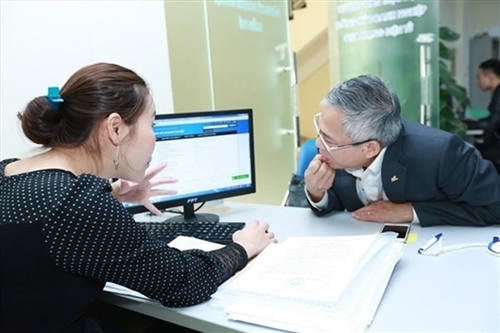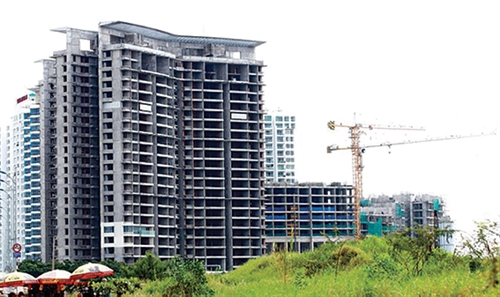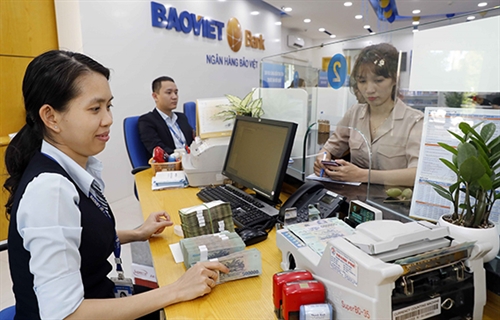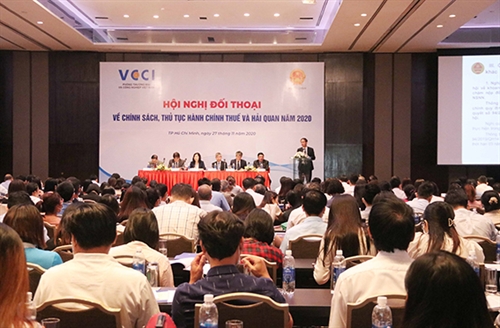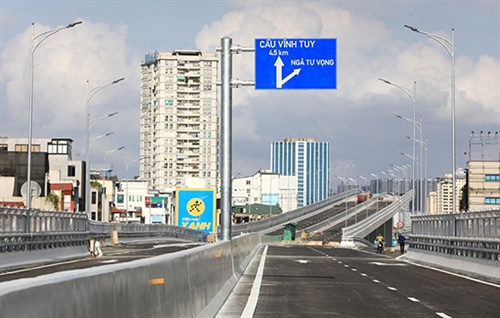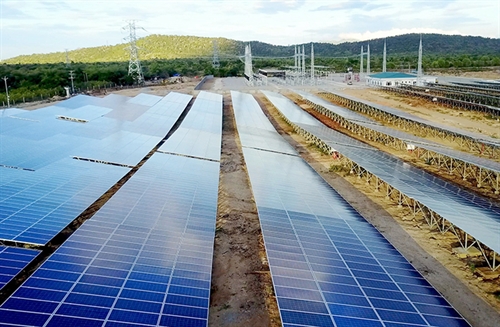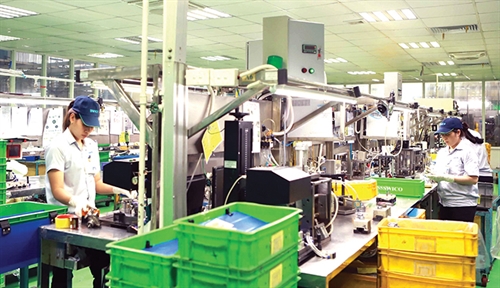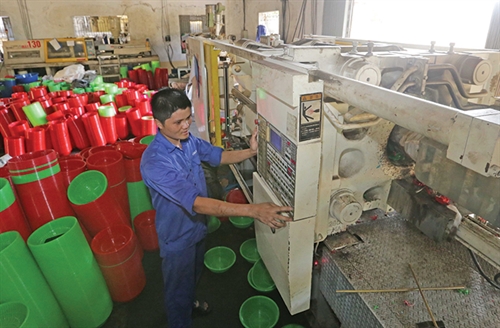From March 3, owners of construction investment projects must work out technical and managerial solutions for ensuring efficient energy use, resource conservation and environmental protection.
This is provided in a recently issued decree, coded 15/2021/ND-CP, detailing a number of provisions of the Construction Law regarding management of construction investment projects.
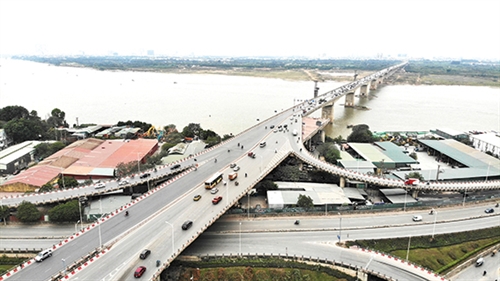 |
| Vinh Tuy bridge spanning over the Red River in Hanoi capital Photo: Danh Lam/VNA |
The Decree goes on to say that the State encourages the construction, development, evaluation and certification of energy-efficient, resource-saving and green works. The application of building information modeling (BIM) and digital technology solutions in construction activities as well as management and operation of construction works will also be promoted. When making decision on construction investment projects, investment deciders also decide whether BIM and digital technology solutions will be applied.
The Decree also introduces noteworthy new regulations, including those on application of foreign standards, selection of project management modes, and capacity requirements applicable to project management units, project owners and construction practitioners.
Application of foreign standards
To facilitate construction activities, the Decree clarifies the application of foreign standards, including international standards, regional standards and standards of foreign countries, and in-house standards as well as the use of new materials and technologies.
Accordingly, for construction projects applying foreign standards, construction design documents or technical instructions, if any, must include assessments of the compatibility, synchronism and compliance of these foreign standards with relevant national technical regulations. Foreign standards that have been widely recognized and applied will be prioritized.
When applying in-house standards, project owners will be required to provide explanations about these standards’ compliance with national technical regulations and compatibility and synchronism with relevant standards. The declaration of in-house standards must strictly comply with regulations and processes provided in other relevant laws.
As for new materials and technologies used or applied for the first time, it is required to ensure compliance with national technical regulations, compatibility with relevant standards as well as feasibility, sustainability, safety and efficiency.
Selection of project management modes
Under Article 62.1 of the 2014 Construction Law, revised under Article 1.19 of the 2020 Law Amending a Number of Articles of the Construction Law, there are four modes of management to be applied to construction investment projects. They are: (i) specialized/ regional project management unit; (ii) single-project management unit; (ii) self-management by project owners; and (iv) outsourcing project management to professional consultancy units.
The Law also specifies that the mode of specialized/regional project management unit will be applied to cases in which investment deciders assign a unit to simultaneously or consecutively manage several public investment projects that belong to the same sector or are implemented in the same geographical area (Article 62.2).
The Decree now makes it clearer by stipulating that for projects using public investment funds, investment deciders will, based on the number and implementation progress of projects that belong to the same sector or are implemented along the same route or in the same administrative area or at the request of donors, choose to apply the mode of specialized project management unit or regional project management unit.
If none of the above-said project management modes is selected, investment deciders will decide to establish single-project management units or assign project owners to perform project management or hire professional consultancy units to manage projects.
Regarding projects using state capital other than public investment funds or capital from other sources, including also PPP projects, investment deciders may pick any of the above-mentioned four project management modes as suitable to management requirements and specific conditions of each project as well as agreements between the parties in project contracts, if any.
Particularly for projects funded with ODA or concessional loans of foreign donors, project management modes must adhere to provisions of ODA treaties or agreements signed with donors. In case these treaties or agreements are silent about this issue, project management modes will comply with this Decree.
The provision allowing project owners to set up single-project management unit is a noteworthy new point of Decree 15. Under current regulations, this management mode is applicable only to group-A projects concerning construction works of special grade or hi-tech projects. According to Decree 15, project owners may establish a single-project management unit to directly manage one or more than one project under their control.
However, a single-project management unit is no longer regarded as “a non-business unit attached to the project owner and having the independent legal person status but “an organization attached to the project owner”. A single-project management unit will have its own seal and may open accounts at state treasury offices or commercial banks in order to perform project management tasks assigned by the project owner; and be held responsible before law and the project owner for project management performance results.
Capacity requirements applicable to project management units, project owners and construction practitioners
Like current regulations, Decree 15 does not require the director of a specialized/regional investment project management unit to have a project management practice certificate, unless he also acts as the director of a specific project. However, it is clearer on diploma requirements applicable to persons holding professional positions, saying that such persons must possess a construction supervision or valuation practice certificate, rather than “a practice certificate relevant to their jobs” as currently prescribed.
The Decree also sets out specific conditions in case project owners decide to manage their projects by themselves, replacing the vague requirement of “being fully qualified” with a concrete stipulation that holders of “project director” title must possess a project management practice certificate, except projects subject to formulation of techno-economic reports only. This requirement is also applied to project directors working under single-project management units. Meanwhile, persons holding professional positions must possess a construction supervision or valuation practice certificate of a grade relevant to the project(s) or work(s) they are in charge of or the job(s) they perform.
Decree 15 also contains detailed provisions on conditions and procedures for grant of construction practice certificates to individuals.
Accordingly, a construction practice certificate will be granted to an applicant who has full civil act capacity; possesses residence or work permit issued by a Vietnamese authority, for foreigners and overseas Vietnamese; has been professionally trained in a relevant discipline and working for a certain period of time in a relevant field; and passes the required test. Dossiers of application for construction practice certificates may be submitted online, sent by post or delivered in person. Competent agencies will grant a certificate to qualified applicants within 20 days after receiving a complete and valid dossier.
Particularly, a construction operation license granted to a foreign contractor will be revoked if: the contractor has forged papers in the dossier of application for construction operation license; the contractor modifies, erases or falsifies the license; the license contains errors due to the fault of the licensing agency; or the license has been issued ultra vires.
Decree 15 replaces Decree 59 of 2015 and Decree 42 of 2017 on management of construction investment projects, and a number of articles of Decree 100 of 2018 on business investment conditions in the fields under the state management of the Ministry of Construction. Regulations of the Government, ministries, ministerial-level agencies and localities which are contrary to Decree 15 were all annulled.- (VLLF)
